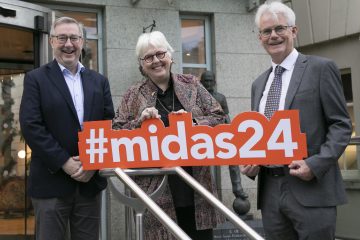The Irish chip design company Movidius has signed a "substantial" sales deal with Google that will allow the software giant to develop new devices using chips made by the Dublin-based firm.
The deal is the first in an expected series of announcements to be made by Movidius with big international technology companies as it seeks to establish a global position at the top of the ‘internet of things’ manufacturing pile.
The tie-up between the two companies will let Google build as-yet unnamed products that can handle large amounts of computer processing by themselves without having to beam the raw data back to servers or data centres for interpretation.
"Think of a security camera," Sean Mitchell, co-founder and chief operating officer of Movidius, told Independent.ie.
"Using our chip, it can understand what it’s seeing or hearing without being told by a more powerful machine in a data centre. In this way it can act with more autonomy and in a more unsupervised way."
One advantage to this, says Mitchell, is that devices have to transfer far less data because they’re capable of making decisions on-site. "It might be one hundredth of the data you would need today when a terminal is dumbly taking in raw data," he said.
It also means that some devices won’t need an internet connection to intelligently assess a situation, widening the range of products and environments they can be used in.
"What Google has been able to achieve with neural networks is providing us with the building blocks for machine intelligence, laying the groundwork for the next decade of how technology will enhance the way people interact with the world," said Blaise Ag?era y Arcas, head of Google’s machine intelligence group in Seattle. "By working with Movidius, we’re able to expand this technology beyond the data center and out into the real world, giving people the benefits of machine intelligence on their personal devices."
Current system can’t do this because the amount of processing power required to intelligently process information such as high resolution video content is beyond the capacity existing, small embeddable chips.
Last year, Google said that it would use Movidius’s technology as part of its own 3D-mapping platform. The move means that Movidius chips could form part of a much wider adoption among phone and mobile device makers.
Movidius’s current line of Irish-designed chips has also attracted the interest of other top-end tech companies that want to position themselves in the ‘internet of things’ sector.
"We talked last year about customer announcements in 2016," said Mitchell. "This is the first one and there’s more to come soon. It’s a substantial deal for us in revenue terms."
Last year, Movidius announced one of Europe’s biggest tech funding rounds, with €38m in cash from investors that included Summit Bridge Capital, the China-Ireland Growth Technology Fund co-managed by Atlantic Bridge Capital and WestSummit Capital, ARCH Venture Partners and DFJ Esprit. The new investment round brought its funding haul to over €83m.
The company was founded in 2006 by David Moloney and Seán Mitchell.
Its main activity is making chips that drive software and hardware product innovation in visual sensing for emerging applications such as virtual reality headsets, drones, home automation, robots, medical devices and wearables. Its most recent chip can process six high definition cameras at once, handling 600 megapixels per second.
Independent.ie: Irish chip design company Movidius signs ‘substantial’ sales deal with Go ogle.
google.com/newsstand/s/CBIwnJmXzy M
2025
MIDAS Ireland welcomes the announcement of ‘Silicon Island’: A National Semiconductor Strategy.
We are delighted that Ireland’s well established and very successful semiconductor is being recognized as strategically important with a Semiconductor Advisory Council to be established to provide the necessary future leadership. The strategy identifies many Read more…

